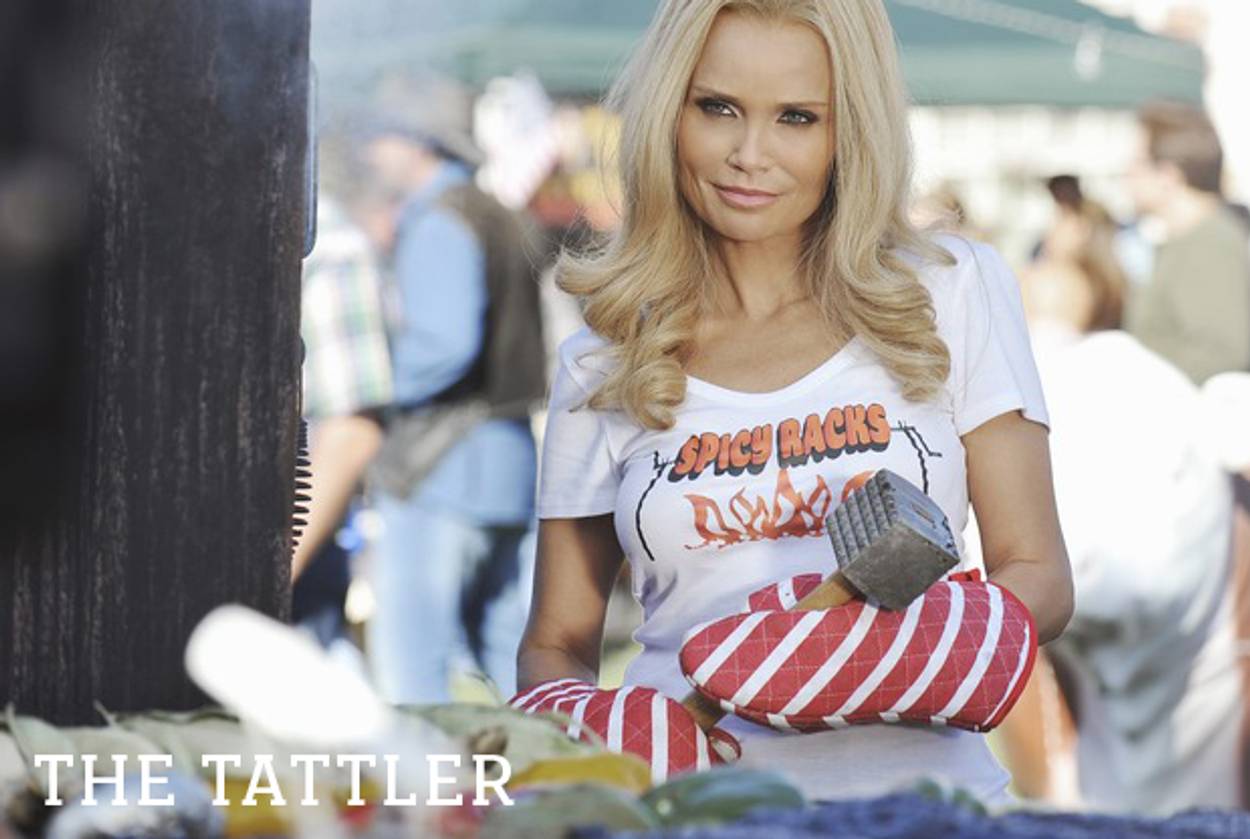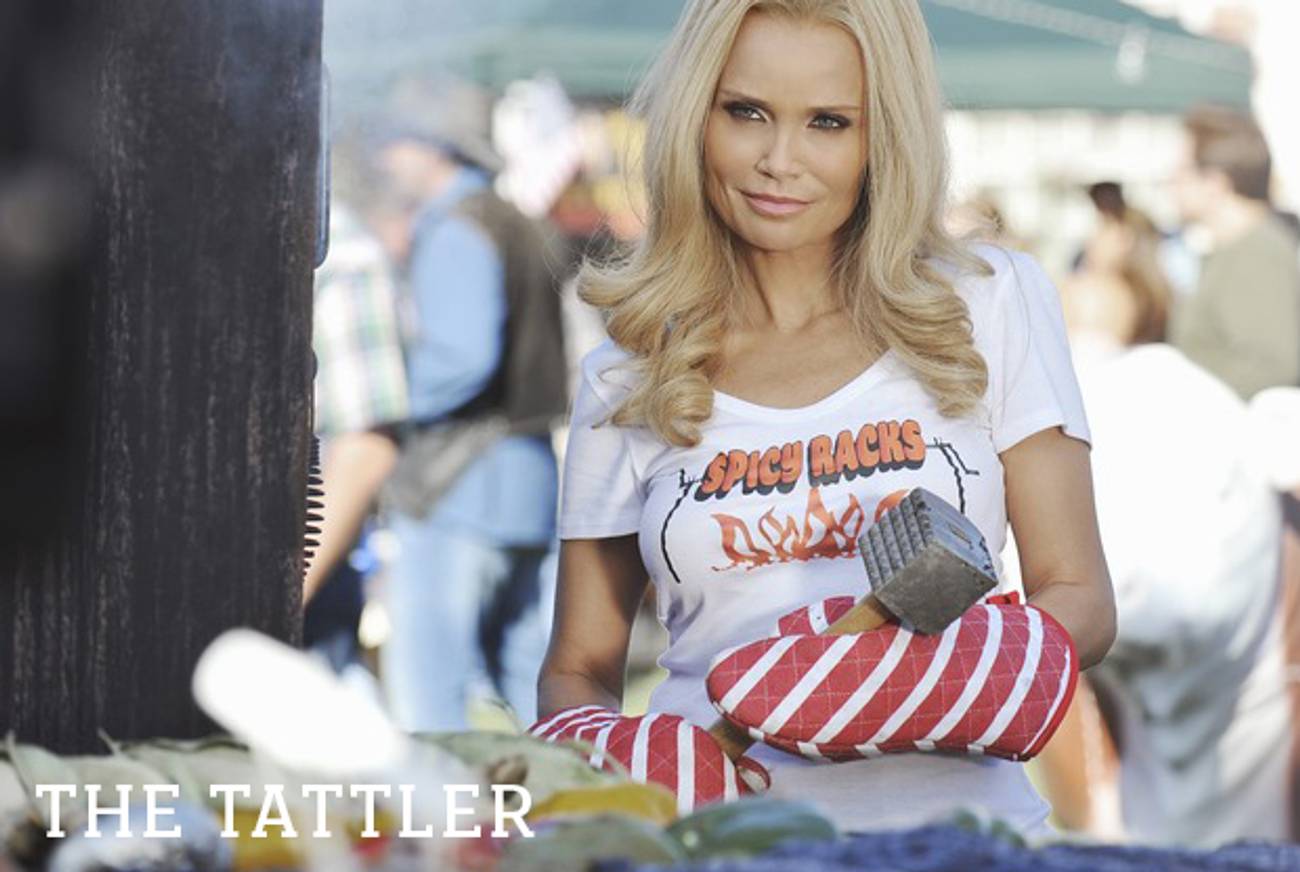Praised Be GCB
The born-again ABC show offers Kristin Chenoweth, camp, and TV that doesn’t require Talmudic analysis




If the media near-blackout and blank stares I receive during my frequent evangelizing on its behalf are any indication, I am the only person in America who is watching GCB, ABC’s hourlong comedy soap about piously venal Dallas socialites and the menfolk they slyly claim to be their “lords and masters.” Beyond making it unlikely that the show will be renewed for a second season, the loneliness of my position doesn’t particularly trouble me. My therapist always says it isn’t the aberrant behavior itself that forms the barrier to mental health; it’s the lack of understanding as to why others find it strange.
So, in the name of sanity, why aren’t people watching GCB?
Perhaps some of the trouble lies in its terrible title, which is ludicrously meaningless unless you happened to read something in Entertainment Weekly more than a year ago about how it was originally called Good Christian Bitches, which morphed, under pressure from all the usual suspects (the American Family Association, the One Million Moms—those people who tried to get J.C. Penney to get rid of spokesperson Ellen DeGeneres on account of her “lifestyle”—the ABC affiliates of the Bible Belt, the state of Utah, et al.) into Good Christian Belles, finally ending up at something that seems like one of those endless acronymic procedurals with various blonde people gravely pouring things into test tubes and that always remind me of my late Polish bubbe’s response to finding out my parents intended to call my sister “Ariel”: “Vot, you gonna give her only initials?” Then there’s the fact that it airs on Sunday nights, when most serious television addicts are occupied with alcoholic ad men/dragons/awkward 20-somethings having sex, awkwardly. I also understand that for the vast majority of Americans, the phrases “created by Robert Harling, writer of Steel Magnolias” or “starring Kristen Chenoweth” do not have the hypnotizing effect it has on me—“Rachel, why don’t you pass the time by playing a little Solitaire, while you listen to the original cast album of Wicked?”—and that for others, four years may not be quite enough time to be ready to watch a bunch of rich, selfish, and born-again Texans flounce heedlessly through life.
What I’m saying is, I get it. I really do. But it’s too bad. GCB is the story of Amanda Vaughn (played by Leslie Bibb), a former head cheerleader cum boilerplate mean girl who returns to her wealthy, oil-soaked home suburb of Dallas in disgrace after the death of her criminal billionaire husband to find those she once tormented all grown up and looking for revenge. But that’s only the nominal premise, one the show has largely—and wisely—discarded in favor of a kind of kooky surrealist camp, as if Gilda Radner was starring in a Tennessee Williams play. In various episodes, a gay man and his ball-busting wife attempt to conceive a child in a Holstein-patterned bed approximately equal in square footage to a one-bedroom in Stuyvesant Town; a brittle Cindy McCain type chokes on a hunk of barbecued elk and drops dead (while dressed as Barbara Bush Sr.); Kristen Chenoweth’s character throws herself a Gone With the Wind-themed vow renewal ceremony while planning a massive residential development called “Condos for Christian Living” in unincorporated Juarez. It’s not exactly the most original material and as a satirical target, it’s about as easy as buying a gun in Florida, but I’ve been lapping it up. And after watching this week’s episode, I finally realized why.
The scene that grabbed me began at the church’s annual interfaith barbecue competition, otherwise known as “Braise the Lord,” at which the GCB’s, for reasons as varying as revenge, financial worries, and yes, even the F-word (you know, “feminism”), would be participating as the first-ever all-female pit team. They strode across the brisket-strewn field of glory in skin-tight T-shirts, their blow-dries bobbing, their glossy lips pursed as the Methodists looked on with hostility, the Baptists with lust. And then they encountered their opponents: the beaming team from Temple B’nai Brith, flashing the girls a non-threatened/threatening, female-empowerment-friendly, thumbs up, beaming like Alan Alda addressing a meeting of the Upper West Side chapter of N.O.W. Upon seeing them, I had two immediate thoughts: The first was “Oh my God. I love this show.” The second was: “Because I am so tired of us.”
Not tired of Jews in real life, obviously—if this was the case, I wouldn’t have much of a social life left. And not even sick of actual Jews on TV, whether they’re playing Jewish characters or not. No, the source of my fatigue is the sensibility that has so thoroughly overtaken “quality” scripted television that you hardly even notice it anymore. The endless parsing of minutiae, the constant examination of one’s motivations, the psychological complication and self-documentation. The anti-heroes struggling to reconcile the two halves of their divided selves, grappling with existential crises as to who they are and where they belong, and that’s before the episode ends and one descends into the labyrinthine Internet world of forums and recaps and instant reviews and live-tweets and after-the-fact tweets and “inside the episodes” breaking down every line, every character choice with Talmudic fervor. Even in a show like Game of Thrones, which on the surface appears concerned mainly with dragons and prostitutes, and prostitutes dressed as dragons and dragons dressed as prostitutes, is actually about childhood trauma and internalized tribalism and questions of what it means to be a moral man in an immoral world. And the perverse thing is that the more introspective television characters get, the less we are in real life. They get smarter, we get stupider; people ask more questions about what makes Don Draper tick than Mitt Romney. As a poor dairyman once said, it’s enough to make a rabbi cross his eyes.
All of which is why the bright, brittle cartoons of GCB, slyly satirical yet deflecting personal reflection to an extent that would make the philosophical architects of the Hitlerjugend proud, are such a glorious relief. It’s not that they aren’t complicated, or don’t live with hypocrisy—sham marriages, extramarital affairs; it’s that they don’t care. They don’t have existential crises, because in their mind there is nothing to resolve. It’s fertile ground for comedy, but more than that: Watching GCB, I think I finally understood the conservative mindset for the first time: Do what you want, don’t ask too many questions, and when in doubt, stick a big diamante cross on your cowboy hat. The unexamined life may not be worth living, but it sure looks like a lot of fun.
***
Like this article? Sign up for our Daily Digest to get Tablet Magazine’s new content in your inbox each morning.
Rachel Shukert, a Tablet Magazine columnist on pop culture, is the author of the memoirs Have You No Shame? and Everything Is Going To Be Great. Starstruck, the first in a series of three novels, is new from Random House. Her Twitter feed is @rachelshukert.
Rachel Shukert is the author of the memoirs Have You No Shame? and Everything Is Going To Be Great,and the novel Starstruck. She is the creator of the Netflix show The Baby-Sitters Club, and a writer on such series as GLOW and Supergirl. Her Twitter feed is @rachelshukert.